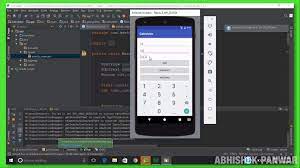Discover the Top Android App Making Software for Seamless Development
The Best Android App Making Software for Your Development Needs
Android app development has become increasingly popular as more businesses and individuals seek to create mobile applications for a wide range of purposes. Whether you’re a seasoned developer or just starting out, having the right tools can make all the difference in creating successful apps. Here, we explore some of the best Android app making software available in the market:
Android Studio
Developed by Google, Android Studio is the official integrated development environment (IDE) for Android app development. It offers a comprehensive set of tools for designing, building, and testing Android apps. With features like code editing, debugging, and performance profiling, Android Studio is a favorite among many developers.
Xamarin
Xamarin is a popular cross-platform app development tool that allows developers to create native Android apps using C# and .NET. It provides a single codebase that can be used to build apps for multiple platforms, saving time and effort in the development process.
Unity
While primarily known as a game development platform, Unity also supports Android app development. Its intuitive interface and powerful features make it an excellent choice for creating interactive and visually appealing apps.
Flutter
Flutter is Google’s UI toolkit for building natively compiled applications for mobile, web, and desktop from a single codebase. With its hot reload feature and rich set of customizable widgets, Flutter simplifies the app development process and allows for fast iteration.
IntelliJ IDEA
IntelliJ IDEA is a robust IDE that supports Android app development through plugins like Kotlin and Java programming languages. With its intelligent code assistance and productivity-boosting features, IntelliJ IDEA is favored by many developers for its efficiency.
Choosing the right Android app making software depends on your specific needs and preferences as a developer. Each of these tools offers unique features and capabilities to help you bring your app ideas to life successfully.
8 Advantages of Using Android App Development Software
- 1. User-Friendly Interfaces
- 2. Cross-Platform Compatibility
- 3. Extensive Libraries
- 4. Real-Time Testing
- 5. Integration Support
- 6. Regular Updates
- 7. Community Support
- 8. Cost-Effective Solutions
Challenges in Android App Development: Learning Curve, Compatibility Issues, and Limited Customization
- Steep learning curve for beginners, requiring time and effort to master the software.
- Compatibility issues may arise when integrating third-party libraries or tools with the app making software.
- Some Android app making software may have limited customization options, restricting developers’ creativity in design and functionality.
1. User-Friendly Interfaces
Many Android app making software tools excel in providing user-friendly interfaces, which play a significant role in democratizing app development for beginners. These intuitive interfaces simplify the complex process of creating mobile applications, enabling users with varying levels of expertise to navigate the development environment with ease. By offering a visually appealing and easy-to-understand interface, these tools empower aspiring developers to bring their app ideas to life without feeling overwhelmed by technical complexities.
2. Cross-Platform Compatibility
Cross-Platform Compatibility is a significant advantage of certain Android app making software. By enabling developers to create apps that can run on multiple platforms, such as Android, iOS, and web applications, this feature saves valuable time and effort. Developers can write code once and deploy their apps across various platforms, reaching a broader audience without the need to rewrite the entire app for each platform. This not only streamlines the development process but also maximizes the app’s potential reach and impact in the competitive mobile market.
3. Extensive Libraries
One significant advantage of using Android app making software is the availability of extensive libraries that contain pre-built components and resources. These libraries streamline the development process by providing developers with ready-to-use elements that can be easily integrated into their apps. By leveraging these libraries, developers can save time and effort, allowing them to focus on enhancing app functionality and user experience rather than reinventing the wheel. This feature not only accelerates development but also ensures consistency and efficiency in building high-quality Android applications.
4. Real-Time Testing
One significant advantage of Android app making software is the ability for developers to conduct real-time testing. By utilizing emulators or physical devices, developers can test their apps instantly to ensure smooth functionality and identify any potential issues early in the development process. This real-time testing feature not only helps in detecting bugs and glitches promptly but also allows developers to fine-tune their apps for optimal performance, resulting in a better user experience overall.
5. Integration Support
Integration Support is a significant advantage of Android app making software, as many options offer seamless integration with third-party services and APIs. This feature allows developers to enhance their app capabilities by leveraging external resources and functionalities, making it easier to incorporate advanced features into their applications. By supporting integration with various services, Android app making software empowers developers to create versatile and dynamic apps that cater to diverse user needs and preferences.
6. Regular Updates
One significant advantage of Android app making software is the regular updates provided by software developers. These updates play a crucial role in enhancing performance, introducing new features, and addressing any security vulnerabilities that may arise. By staying current with the latest updates, developers can ensure that their apps remain competitive, secure, and optimized for the best user experience possible.
7. Community Support
One significant advantage of Android app making software is the strong community support it offers. Many tools have active communities where developers can engage with fellow professionals, seek assistance, exchange knowledge, and collaborate on projects. This vibrant community ecosystem not only fosters learning and growth but also provides a valuable network of like-minded individuals who are passionate about creating innovative Android applications.
8. Cost-Effective Solutions
Utilizing Android app making software provides a cost-effective solution for developing top-notch Android applications without requiring significant resources. These tools streamline the development process, offering efficient ways to create high-quality apps within budget constraints. By leveraging such software, developers can optimize their workflow, reduce development time, and ultimately deliver polished Android apps that meet user expectations without breaking the bank.
Steep learning curve for beginners, requiring time and effort to master the software.
One significant drawback of some Android app making software is the steep learning curve, especially for beginners. Mastering the intricacies of these tools can be time-consuming and challenging, demanding a considerable amount of effort from new developers. Navigating through complex features and understanding the technical aspects of the software may pose a barrier to entry for those just starting in app development, potentially slowing down the learning process and hindering quick progress in creating Android applications.
Compatibility issues may arise when integrating third-party libraries or tools with the app making software.
When using Android app making software, one significant drawback that developers may encounter is the potential for compatibility issues when integrating third-party libraries or tools. These external components play a crucial role in enhancing app functionality and performance, but they can sometimes lead to conflicts with the app making software. Such compatibility issues may result in errors, bugs, or even crashes within the app, requiring thorough troubleshooting and adjustments to ensure smooth integration and overall stability of the final product. Developers need to carefully evaluate and test third-party components before incorporating them into their projects to mitigate the risks associated with compatibility challenges.
Some Android app making software may have limited customization options, restricting developers’ creativity in design and functionality.
Some Android app making software may present a significant drawback in the form of limited customization options, which can hinder developers’ ability to fully unleash their creativity in both design and functionality aspects. When software tools lack flexibility in customization, developers may find themselves constrained by pre-set templates or limited styling choices, ultimately limiting the uniqueness and innovation potential of their apps. This limitation can be frustrating for developers who strive to create highly personalized and distinctive mobile applications tailored to specific user needs and preferences.





